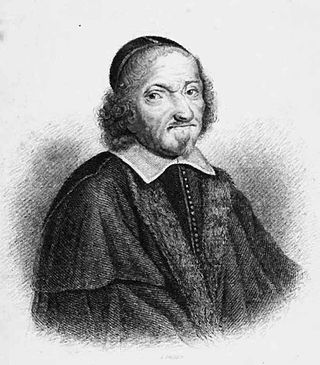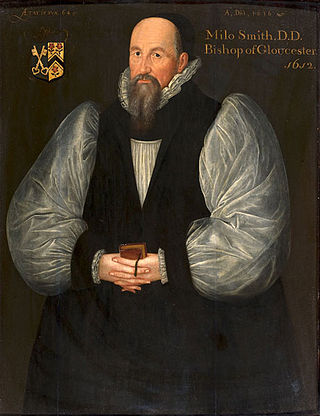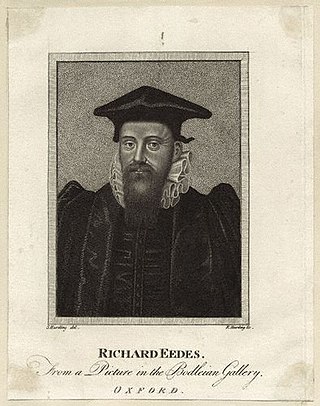
Lancelot Andrewes was an English bishop and scholar, who held high positions in the Church of England during the reigns of Elizabeth I and James I. During the latter's reign, Andrewes served successively as Bishop of Chichester, of Ely, and of Winchester and oversaw the translation of the King James Version of the Bible. In the Church of England he is commemorated on 25 September with a lesser festival.

Myles Coverdale, first name also spelt Miles, was an English ecclesiastical reformer chiefly known as a Bible translator, preacher and, briefly, Bishop of Exeter (1551–1553). In 1535, Coverdale produced the first complete printed translation of the Bible into English. His theological development is a paradigm of the progress of the English Reformation from 1530 to 1552. By the time of his death, he had transitioned into an early Puritan, affiliated to Calvin, yet still advocating the teachings of Augustine.

Richard Bancroft was an English churchman, Archbishop of Canterbury from 1604 to 1610 and "chief overseer" of the King James Bible.

Minster, also known as Minster-in-Thanet, is a village and civil parish in the Thanet District of Kent, England. It is the site of Minster in Thanet Priory. The village is west of Ramsgate and to the north east of Canterbury; it lies just south west of Kent International Airport and just north of the River Stour. Minster is also the "ancient capital of Thanet". At the 2011 Census the hamlet of Ebbsfleet was included.
The Most Reverend Canon Richard Culmer of Canterbury (1597–1662) was an English Puritan clergyman, iconoclast, and theologian. He is listed by the Oxford Dictionary of National Biography as being of unknown parentage, although some sources indicate that he was the eldest son of Sir Henry Culmer, the first Baron Culmer. According to this family tree, Sir Henry, himself a son of a Henry Culmer, had married Mary Baldwyn of Kent in 1602, and was created a Baron by King Charles I in 1630. Although this is not listed in Burke's Peerage, his family was of considerable importance.

Samuel Ward (1572–1643) was an English academic and a master at the University of Cambridge. He served as one of the delegates from the Church of England to the Synod of Dort.

Laurence Chaderton (c. September 1536 – 13 November 1640) was an English Puritan divine, the first Master of Emmanuel College, Cambridge and one of the translators of the King James Version of the Bible.

Wulfred was an Anglo-Saxon Archbishop of Canterbury in medieval England. Nothing is known of his life prior to 803, when he attended a church council, but he was probably a nobleman from Middlesex. He was elected archbishop in 805 and spent his time in office reforming the clergy of his cathedral. He also quarrelled with two consecutive Mercian kings – Coenwulf and Ceolwulf – over whether laymen or clergy should control monasteries. At one point, Wulfred travelled to Rome to consult with the papacy and was deposed from office for a number of years over the issue. After Coenwulf's death, relations were somewhat better with the new king Ceolwulf, but improved much more after Ceolwulf's subsequent deposition. The dispute about control of the monasteries was not fully settled until 838, after Wulfred's death. Wulfred was the first archbishop to place his portrait on the coinage he struck.

John Overall (1559–1619) was the 38th bishop of the see of Norwich from 1618 until his death one year later. He had previously served as Bishop of Coventry and Lichfield, as Dean of St Paul's Cathedral from 1601, as Master of Catharine Hall from 1598, and as Regius Professor of Divinity at Cambridge University from 1596. He also served on the Court of High Commission and as a Translator of the King James Version of the Bible.
Hadrian à Saravia, sometimes called Hadrian Saravia, Adrien Saravia, or Adrianus Saravia was a Protestant theologian and pastor from the Low Countries who became an Anglican prebend and a member of the First Westminster Company charged by James I of England to produce the King James Version of the Bible.
Andrew Bing (1574–1652) was an English scholar. He was a fellow of Peterhouse, Cambridge, and succeeded Geoffrey King as Regius Professor of Hebrew at Cambridge. He served on the "First Cambridge Company" charged by James I of England with translating parts of the Old Testament for the King James Version of the Bible.

Miles Smith was a clergyman of the Church of England renowned as a most accomplished theologian, scholar and bibliophile. After attaining the degree of DD, or doctor of divinity, he progressed to become Bishop of Gloucester (1612-1624). Although he may have been at times an indifferent administrator, his erudition contributed fundamentally to the translation and production of the King James Bible.
John Duport was an English scholar and translator.
Philip John Moore is an English composer and organist.
Mark Hiddesley or Hildesley was an Anglican churchman. He served as vicar of Hitchin in Hertfordshire and later as Bishop of Sodor and Man between 1755 and 1772, where he encouraged Bible translations into Manx.
Nicholas [of] Hereford was an English Bible translator, Lollard, reformer on the side of John Wycliffe, Fellow of The Queen's College, Oxford and Chancellor of the University of Oxford in 1382. He was a Doctor of Theology, which he achieved at Oxford University in 1382.

Richard Edes (1555–1604) was an English churchman. He became Dean of Worcester, and was nominated one of the translators for the Authorised King James Version, in the Second Oxford Company, but died in the earliest stages of the project.

Domne Eafe, also Domneva, Domne Éue, Æbbe, Ebba, was, according to the Kentish royal legend, a granddaughter of King Eadbald of Kent and the foundress of the double monastery of Minster in Thanet Priory at Minster-in-Thanet during the reign of her cousin King Ecgberht of Kent. A 1000-year-old confusion with her sister Eormenburg means she is often now known by that name. Married to Merewalh of Mercia, she had at least four children. When her two brothers, Æthelred and Æthelberht, were murdered she obtained the land in Thanet to build an abbey, from a repentant King Ecgberht. Her three daughters all went on to become abbesses and saints, the most famous of which, Mildrith, ended up with a shrine in St Augustine's Abbey, Canterbury.
The college of Six Preachers of Canterbury Cathedral was created by Archbishop Thomas Cranmer as part of the reorganisation of the monastic Christ Church Priory into the new secular Cathedral. First mentioned in a letter of Cranmer to Thomas Cromwell in 1540, the Six Preachers were established by the Statutes of 1541. They were provided with houses in the Precincts but quickly became non-resident and rented out their properties. They had the right to dine with the Dean and Canons and to sit in the stalls in the quire with the canons during services. They were required to preach 20 sermons a year in their own parishes or in a church dependent on the Cathedral, as well as preaching in the Cathedral.

The reign of King James I of England (1603–1625) saw the continued rise of the Puritan movement in England, that began during reign of Queen Elizabeth (1558–1603), and the continued clash with the authorities of the Church of England. This eventually led to the further alienation of Anglicans and Puritans from one another in the 17th century during the reign of King Charles I (1625–1649), that eventually brought about the English Civil War (1642–1651), the brief rule of the Puritan Lord Protector of England Oliver Cromwell (1653–1658), the English Commonwealth (1649–1660), and as a result the political, religious, and civil liberty that is celebrated today in all English speaking countries.











